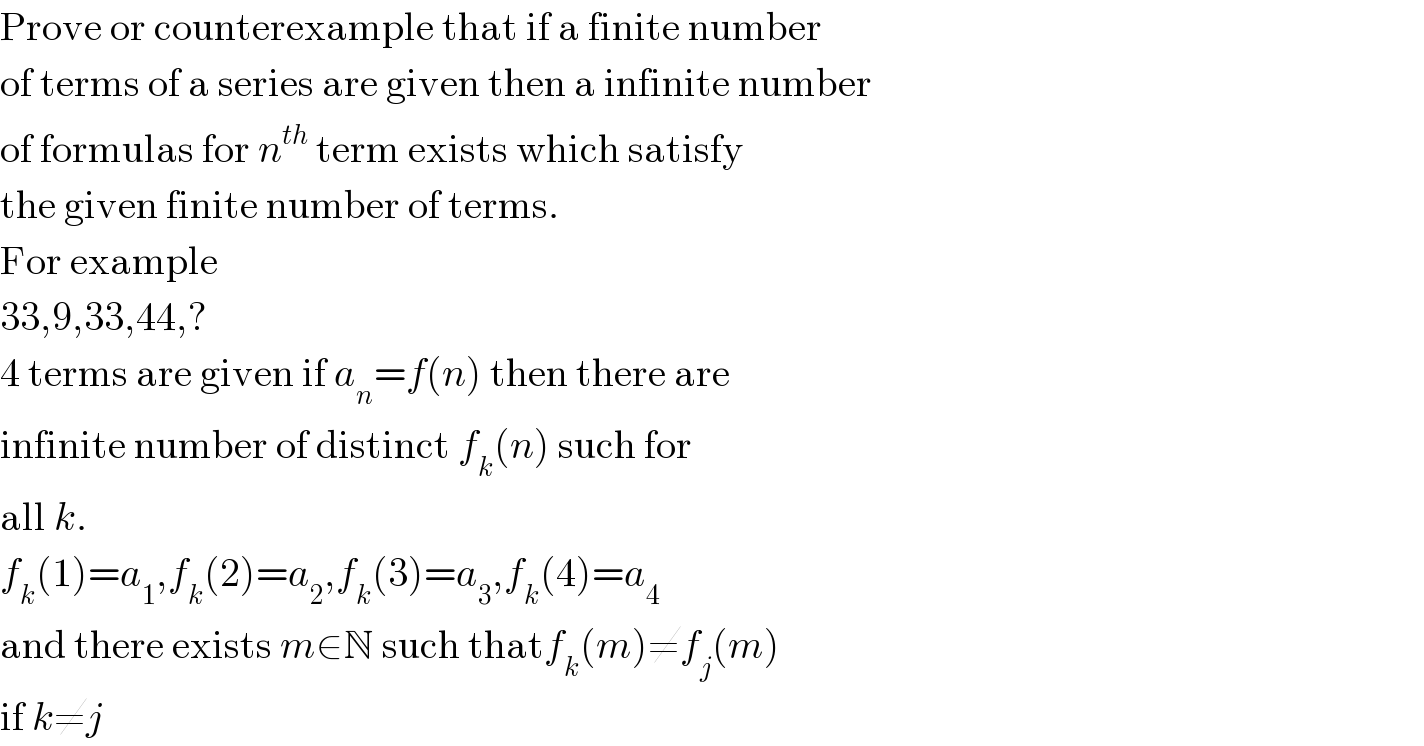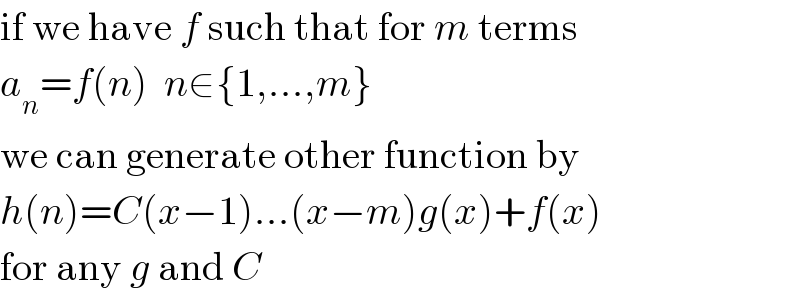
Question Number 4720 by prakash jain last updated on 29/Feb/16

$$\mathrm{Prove}\:\mathrm{or}\:\mathrm{counterexample}\:\mathrm{that}\:\mathrm{if}\:\mathrm{a}\:\mathrm{finite}\:\mathrm{number}\: \\ $$$$\mathrm{of}\:\mathrm{terms}\:\mathrm{of}\:\mathrm{a}\:\mathrm{series}\:\mathrm{are}\:\mathrm{given}\:\mathrm{then}\:\mathrm{a}\:\mathrm{infinite}\:\mathrm{number} \\ $$$$\mathrm{of}\:\mathrm{formulas}\:\mathrm{for}\:{n}^{{th}} \:\mathrm{term}\:\mathrm{exists}\:\mathrm{which}\:\mathrm{satisfy} \\ $$$$\mathrm{the}\:\mathrm{given}\:\mathrm{finite}\:\mathrm{number}\:\mathrm{of}\:\mathrm{terms}. \\ $$$$\mathrm{For}\:\mathrm{example} \\ $$$$\mathrm{33},\mathrm{9},\mathrm{33},\mathrm{44},? \\ $$$$\mathrm{4}\:\mathrm{terms}\:\mathrm{are}\:\mathrm{given}\:\mathrm{if}\:{a}_{{n}} ={f}\left({n}\right)\:\mathrm{then}\:\mathrm{there}\:\mathrm{are} \\ $$$$\mathrm{infinite}\:\mathrm{number}\:\mathrm{of}\:\mathrm{distinct}\:{f}_{{k}} \left({n}\right)\:\mathrm{such}\:\mathrm{for} \\ $$$$\mathrm{all}\:{k}. \\ $$$${f}_{{k}} \left(\mathrm{1}\right)={a}_{\mathrm{1}} ,{f}_{{k}} \left(\mathrm{2}\right)={a}_{\mathrm{2}} ,{f}_{{k}} \left(\mathrm{3}\right)={a}_{\mathrm{3}} ,{f}_{{k}} \left(\mathrm{4}\right)={a}_{\mathrm{4}} \\ $$$$\mathrm{and}\:\mathrm{there}\:\mathrm{exists}\:{m}\in\mathbb{N}\:\mathrm{such}\:\mathrm{that}{f}_{{k}} \left({m}\right)\neq{f}_{{j}} \left({m}\right)\: \\ $$$$\mathrm{if}\:{k}\neq{j} \\ $$
Answered by 123456 last updated on 29/Feb/16

$$\mathrm{if}\:\mathrm{we}\:\mathrm{have}\:{f}\:\mathrm{such}\:\mathrm{that}\:\mathrm{for}\:{m}\:\mathrm{terms} \\ $$$${a}_{{n}} ={f}\left({n}\right)\:\:{n}\in\left\{\mathrm{1},...,{m}\right\} \\ $$$$\mathrm{we}\:\mathrm{can}\:\mathrm{generate}\:\mathrm{other}\:\mathrm{function}\:\mathrm{by} \\ $$$${h}\left({n}\right)={C}\left({x}−\mathrm{1}\right)...\left({x}−{m}\right){g}\left({x}\right)+{f}\left({x}\right) \\ $$$$\mathrm{for}\:\mathrm{any}\:{g}\:\mathrm{and}\:{C} \\ $$
